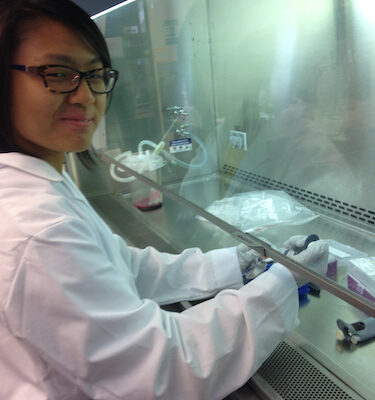Celia Cheung Sciences
Microfluidics and Alzheimer's Disease: A Device to Study the Amyloid Beta Protein
Current Bio: After graduation, Celia spent a year researching abroad at Imperial College London, funded by the Whitaker Fellowship in biomedical engineering. In August 2016, she started medical school at UC Irvine, and is expected to graduate in June 2021. Currently, she is taking a year off to do more bioengineering research, but eventually plans to enter medical residency for pediatrics. Her passion is both for clinical practice as well as finding engineering solutions to unmet clinical needs.
Haas Scholars Project: Alzheimers disease is the 6th leading cause of death in the United States, affecting over 5 million people aged 65 and older. The disease is defined pathologically by the aggregation of the amyloid beta (AB) peptide, forming abnormal clumps of protein in the brain. Understanding the environmental conditions that cause or inhibit the aggregation of AB is crucial for developing new methods of treatment and drug candidates for Alzheimers. The field of microfluidics allows for fast, inexpensive, and accurate methods of conducting experiments, by requiring only microliter-scale volumes of samples. Celias research project is to improve a pre-existing method of studying AB aggregation, by miniaturizing the experimental setup onto a microfluidic chip. The device may aid the scientific community in molecular studies and tests for molecules to inhibit AB aggregation, as well as possibly enable drug screening for Alzheimers disease.
